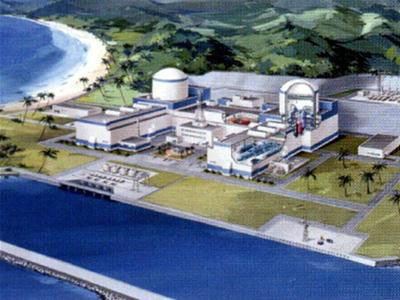I have blogged in the past about the push by the nations that produce nuclear components, reactors and fuel to sell nuclear reactors to the developing world. While the nuclear industry brags about international sales prospects, the truth is not as attractive. Aside from all the usual dangers associated with nuclear power that I have detailed in many posts, there are some special issues with building nuclear reactors in developing nations. Fortunately some of the developing nations are being cautious about adopting nuclear power.
Vietnam must find new sources of electricity. It used to export coal but now it has to import coal. It is running out of oil and natural gas and it has exploited most opportunities for hydro power. Vietnam had plans to build thirteen nuclear reactors at eight power plants by 2030. These reactors would supply fifteen gigawatts to the Vietnamese national grid.
Russia aggressively courted Vietnam and was rewarded with a 2010 contract to build the first plant called Ninh Thuan 1. Russia has promised to lend Vietnam eight billion dollars for the project. The Russian deal will have Russia's Rosatom build the reactor, staff the reactor, provide fuel and remove spent fuel. A nice comprehensive arrangement. Construction was to have begun in 2014 and was going to take about six years.
In 2011, Vietnam contracted with Japan Atomic Power to have a feasibility study conducted on the construction of a second nuclear power plant called Ninh Thuan 2, near Ninh Thuan 1. This plant will be constructed using U.S. or Japanese technology. Westinghouse, a U.S. subsidiary of Japan's Toshiba corporation, is very interested in building Ninh Thuan 2. They just signed an agreement with Vietnam to train staff to manage and operate nuclear power plants.
Vietnam pushed back the start of construction for Ninh Thuan 1 from 2014 to 2017. Just recently a government official said that the start of construction was now scheduled for 2019. Apparently creating the "legal framework" necessary for the construction project has proven to be more difficult that was expected. In addition, demand for electricity in Vietnam has not risen as much as was forecast. The demand this year was about a hundred and fifty billion kilowatt hours as opposed to the predicted demand of around two hundred billion kilowatt hours. This is partly due to reduced economic growth.
Safety concerns have also slowed work on the nuclear projects. The Fukushima nuclear disaster in Japan caused the Vietnamese government to reassess its safety protocols. Fortunately for the Vietnamese people, the government is making nuclear safety a priority.
Vietnam was ranked one hundred nineteenth in an international corruption index in 2014 out of one hundred and seventy five nations. Corruption in the construction, operation and/or regulation of nuclear power reactors can have devastating consequences. Corruption was part of the cause of the Fukushima nuclear disaster.
There is also the matter of nuclear blackmail. If Russia goes ahead with its plan, it could easily turn off the Ninh Thuan 1 power plant any time it wanted to pressure Vietnam to support its foreign policy. Considering that it will be five years before construction of the first power reactor even begins in Vietnam, they would be better served to explore alternative sustainable sources of power such as solar, wind and tidal systems.
Artist's concept of Ninh Thuan 1 Nuclear Power Plant:
